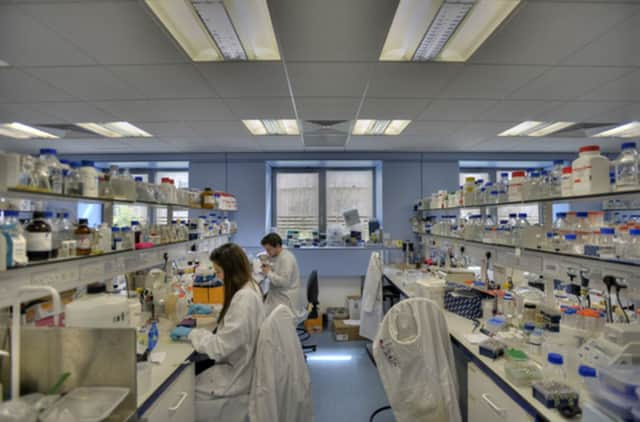Increasing human lifespan isn’t useful goal in itself


Benjamin Franklin wrote in 1789: “In this world nothing can be said to be certain, except death and taxes.” At the time of his death in 1790, average life expectancy in Scotland was around 40.
Due to many factors, not least better diet, safer living and working conditions, cleaner water, antibiotics and other medical advances, average life expectancy in Scotland is now 77 years for men and 81 years for women.
Advertisement
Hide AdAdvertisement
Hide AdAmazingly, this increase, which equates to an extra 2.5 years of living per decade since the mid-1800s, is showing little indication of slowing down.
Unquestionably, the near eradication of deaths from tuberculosis, cholera and from complications arising during childbirth is patently wonderful, but the demographic shift to a population containing a greater and greater proportion of elderly individuals comes with its own set of difficulties.
One clear consequence of living longer is that your risk of developing cardiovascular disease, stroke, dementia, type-II diabetes and cancer increases significantly.
Likewise, our changing demographics are having profound economic and social impacts, with Audit Scotland recently reporting that the £4.5 billion we pay for elderly care in Scotland is unsustainable.
Consequently, population ageing is a major societal challenge that needs addressed. Many scientists believe that if we can understand the biological processes that drive ageing, then we can intervene to slow ageing.
If this can be done then our ultimate aspiration would be to delay and lessen the impact of all age-related diseases simultaneously, effectively maximising the period of life free from age-associated disease (healthspan).
There are many complimentary approaches to understanding why and how we age. Many scientists exploit the differences in lifespan between species across the natural world; we know that birds live much longer than similarly sized mammals.
However, unquestionably much of what we understand about ageing has been discovered in laboratory model organisms (eg roundworms, fruit flies, mice).
Advertisement
Hide AdAdvertisement
Hide AdWhilst historically it was thought that ageing was intractable, we now know that the ageing process can be modulated, for example it can be slowed by various environmental, genetic and drug interventions.
We know that reductions in daily food intake and even in particular amino acids (e.g. methionine) within the diet can increase lifespan in model organisms.
More recently, studies have also shown that the manipulation (usually loss) of single genes in mice (out of 25,000) through genetics or drugs can also extend lifespan.
Strikingly, some of these same genes are associated with human longevity, suggesting similarities exist in the factors that affect ageing rate in model organisms and in humans.
As discussed earlier, the main driver for most scientists studying ageing is to eventually identify suitable interventions to extend healthspan in humans.
Importantly, those same interventions which extend lifespan also act to help maintain late-life health in model organisms.
Quite clearly, one of the greatest challenges in ageing research now is to translate what we know in animal models to humans, what environmental factors affect the rate of ageing, and if possible, discover how it is that some kinds of animals age much more slowly than others.
This will not be easy given that the ageing process is incredibly complex, with clear differences in ageing rate existing between individuals of the same species and even within particular cell types within the same individual.
Advertisement
Hide AdAdvertisement
Hide AdSimilarly, the effectiveness of the interventions that extend lifespan and healthspan is dependent on many factors, not least sex.
If we hope to translate our findings to humans it requires a multidisciplinary approach; that is bringing together scientists with a range of skills and knowledge base but with a common goal.
Recently such an approach was initiated at The University of Glasgow, with the launch of The Glasgow Ageing Research Network (GARNER). This multidisciplinary research initiative comprises a grouping of scientists with a wide range of backgrounds (eg clinical research, ecology and evolutionary biology, molecular and cellular biology, chemistry, engineering, psychology, social science) from across the College of Medical, Veterinary and Life Science; College of Social Sciences and College of Science and Engineering.
While significant challenges exist in designing and delivering safe and effective interventions to increase healthspan in humans, there is definitely room for optimism.
It is heartening to note that Benjamin Franklin mapped the Gulf Stream at 62 years of age, helped draft the American Declaration of Independence at 70 and invented bifocals in his late seventies.
So while it is evident that nothing is certain in this life except death and taxes, it is very likely in the future that we will be able to intervene in ageing to extend the period of our life free from age-associated diseases.
Unfortunately any intervention to lessen the pain of taxes may be too great an obstacle to overcome.
• Colin Selman is professor of biogerontology at The University of Glasgow. The Glasgow Ageing Research Network (GARNER) explores all the facets of ageing. For more information visit http://www.gla.ac.uk/garner